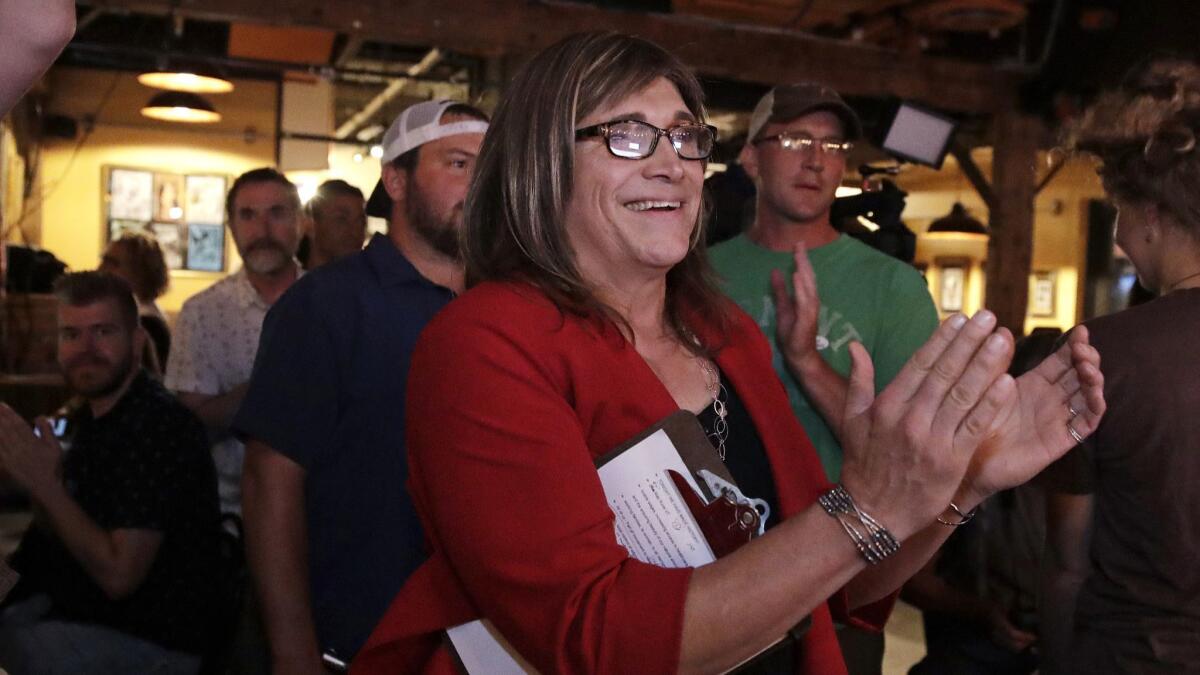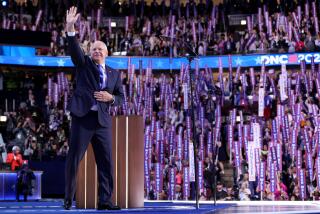Democrats select transgender candidate for governor and other ceiling-breaking nominees in primaries

- Share via
Democrats continued their pattern of nominating glass-ceiling breakers Tuesday by selecting a transgender woman as their gubernatorial nominee in Vermont and a black woman as a congressional nominee in Connecticut.
If elected in November, Christine Hallquist, a former utility company executive, would be the first transgender governor of any state, and Jahana Hayes, a former national teacher of the year, would be the first black woman to represent New England in the House.
Hallquist will face Gov. Phil Scott, a popular incumbent in the Democratic-leaning state. Hayes, who was endorsed by liberals including New York City candidate Alexandria Ocasio-Cortez and Sen. Christopher S. Murphy (D-Conn.), is strongly favored in a district that Clinton won by 5 percentage points in 2016.
The seat was open after Rep. Elizabeth Esty (D-Conn.) announced she would not seek reelection after the mishandling of a sexual harassment scandal by staff in her office.
With just 84 days before the general election, primary voters cast ballots in Wisconsin, Minnesota, Vermont and Connecticut to choose candidates for governor and other state offices, amid heated campaigns for the U.S. House and Senate.
Arrest records, a #MeToo controversy and the specter of President Trump all loomed large Tuesday as Republicans competed to show fidelity to the president.
In Wisconsin, a Democratic contest for the seat of retiring Republican House Speaker Paul D. Ryan has been rocked by recent claims by candidate Cathy Myers, a grass-roots activist, that the arrest record of her rival, Randy “Iron Stache” Bryce, will prevent him from winning in November.
Bryce, an early Democratic fundraising phenom, said the arrests in the 1990s, related to a drunk driving conviction and a marijuana possession charge, were learning experiences. (He also was arrested more recently while protesting Republican policies.)
“I’ve worked very hard to learn from my mistakes so I can be a man my son can be proud of,” he said in a statement in response to the resurfacing of the old charges.
He is expected to face Bryan Steil, a Ryan-endorsed lawyer, who is running against a self-described “pro-white” nationalist candidate who was banned from Twitter after sending a racist message targeting American actress Meghan Markle before her marriage to Britain’s Prince Harry.
Democrats faced another controversy in Minnesota, where allegations of abuse shadowed the vice chair of the Democratic Party, Rep. Keith Ellison, as he sought his party’s nomination for attorney general.
The allegations of physical and emotional abuse were publicized in recent days by the children of the ex-girlfriend, Karen Monahan, who released text messages alleged to have come from Ellison and said he verbally abused her and once dragged her from a bed.
Over the weekend, Ellison, who was favored over four Democratic opponents, released a statement denying the claims. “Karen and I were in a long-term relationship which ended in 2016,” he wrote in the statement, “and I still care deeply for her well-being.”
Morgan Long, a 31-year-old Democrat from Richfield, Minn., said outside a polling station in north Minneapolis that the allegations against Ellison prompted her to “stop and take a look at who he is as a candidate.” “It’s coming down to the wire,” she said. “I’m still evaluating everything and I want to make the most educated decision as possible.”
But Long, who works in human resources for a software consulting firm, she said she would probably vote for Ellison in the end because of his record on progressive issues.
“There has to be investigations involved. I’m about facts,” she said.
The political left in Minnesota has been hit hard by the challenge of sorting through claims of sexual harassment, which became a major political issue when a tape surfaced in 2016 of Trump boasting about assaulting women.
Former Sen. Al Franken, a liberal Democratic icon in the state, resigned eight months ago after several women alleged that he had behaved inappropriately and one revealed a photo of Franken, then a comedian, pretending to grab at her breasts in an apparent attempt at humor. Months earlier, Garrison Keillor, the former star of Minnesota Public Radio’s “Prairie Home Companion,” was fired after a woman came forward to allege harassment by him.
Minnesota Republicans decisively rejected the comeback bid of former Gov. Tim Pawlenty, a onetime kingmaker in state politics who proved unable to overcome his 2016 description of Donald Trump as “unhinged and unfit” for once boasting of grabbing women.
The surprise result was just the latest evidence of the president’s rising control over the Republican Party electorate and the waning power of veteran lawmakers, coming just a week after Trump’s endorsement helped Kansas secretary of state Kris Kobach topple incumbent Gov. Jeff Colyer, who conceded the race Tuesday.
After conceding the race at a campaign rally Tuesday and throwing his support behind Johnson, Pawlenty spoke briefly with reporters.
“The Republican Party has shifted,” he said, according to a reporter for the Minneapolis Star Tribune. “It is the era of Trump and I’m just not a Trump-like politician.”
A twice-elected governor, former presidential candidate and banking lobbyist, Pawlenty lost decisively to Jeff Johnson, a commissioner of Hennepin County.
By far the most expensive race of the day was a Republican contest in Wisconsin for the chance to challenge Sen. Tammy Baldwin, a Democrat who is favored to win reelection. State Sen. Leah Vukmir, a local party favorite, and Kevin Nicholson, a self-styled outsider and former Democratic activist backed by the most generous billionaire in conservative politics, were locked in a tight battle as the GOP primary approached.
The Wisconsin Senate race has attracted nearly $29 million in spending on advertising, according to a Democratic media buyer, including about $8 million in support of Nicholson from groups that have been backed by conservative businessman Richard Uihlein of Illinois.
Some of those ads have tried to paint Vukmir as insufficiently supportive of Trump; she called him “offensive to everyone” during the Republican primaries in 2016. She later endorsed his campaign and supported him over Hillary Clinton.
The Wisconsin contest comes at a time of growing concern for the state’s Republican Party, which has suffered a string of losses in recent special elections against Democrats who are newly energized in opposition to Trump.
“This a true wake-up call,” Gov. Scott Walker said in April after a liberal judge was elected to the state Supreme Court. “There could be a blue wave out there.”
Nicholson, Vukmir and Walker have all tried to distance themselves from Trump’s recent call to boycott Harley-Davidson after the Wisconsin-based motorcycle maker announced that it would move some production overseas to avoid recent tariffs imposed in response to Trump’s trade policies.
Walker was expected to win nomination for a third term after facing token opposition in the primary. He is likely to face Democratic state schools Supt. Tony Evers, who has been leading the polls in a crowded field of Democrats.
Political strategists will also be watching the outcome of primaries in four competitive House districts in Minnesota, two held by Republicans and two by Democrats, which could help decide whether Democrats maintain control of Congress in the fall.
Two Democratic seats that could go to Republicans are set to be vacated by Walz, who is running for governor, and Rep. Rick Nolan, who is retiring. Democrats have put forward an Army veteran, Dan Feehan, in Walz’s district, which stretches across the state’s rural southern border area. He is likely to face a repeat Republican candidate, Jim Hagedorn, who narrowly lost in 2016.
Democrats have five candidates running to replace Nolan in the northeastern corner of the state, which includes Duluth. The winner will face Pete Stauber, a professional hockey player-turned-police officer, who has been endorsed by Trump.
Two Republican seats in the Minneapolis suburbs are also at risk. Rep. Jason Lewis, who has been fighting renewed controversy over insensitive statements about blacks and women that he uttered as a talk radio host, is facing Angie Craig, a corporate manager and mother of four boys with her wife, Cheryl.
Rep. Erik Paulsen, who comes from the type of suburban district that has been moving away from the GOP since Trump’s election, is expected to face Democrat Dean Phillips, a businessman who has been campaigning for increased gun control.
11:50 p.m.: This article was updated with results from Minnesota.
This article was originally published at 9:15 p.m.
More to Read
Get the L.A. Times Politics newsletter
Deeply reported insights into legislation, politics and policy from Sacramento, Washington and beyond. In your inbox three times per week.
You may occasionally receive promotional content from the Los Angeles Times.










